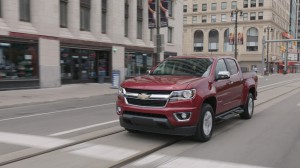We’ve entered the “sharing economy,” the experts tell us, with home-sharing operations such as AIRBNB, ride-sharing companies like Uber and car-sharing ventures like Car2Go becoming increasingly popular with American travelers and commuters. But now, General Motors’ own sharing service, Maven, is testing a program that could give GM owners a way to profit from this trend.
Maven has launched what it calls a “peer-to-peer car-sharing beta” that allows owners of relatively recent GM products to list their own cars through the service and pocket some of rental fees. If the program takes off, it would join other peer-to-peer car-sharing services such as Turo. And French automaker PSA, in its bid to return to the U.S., has launched a similar program in Los Angeles.
“Your car is one of the most expensive things you own. Sitting idle, it is a wasted asset,” said Julia Steyn, vice president, General Motors Urban Mobility and Maven. “It’s time to put your car to work. Maven’s peer-to-peer offering is a smart way for owners to offset their vehicle investment.”
The beta program debuts in three cities: Chicago, Detroit and Ann Arbor, Michigan, though it could eventually roll out across the country. Owners of Buick, Cadillac, Chevrolet or GMC models from the 2015 model-year or newer will be allowed to participate.
Owners will be able to specify when and where the vehicles will be available. That might mean during business hours when the car, crossover or truck would otherwise be sitting in a parking lot. Owners will also be able to set their own price, though Maven will provide a guide to what comparable models are going for. The GM car-sharing service estimates that the owner’s cut for a vehicle like a Chevy Equinox that is rented every day could come out to as much as $500 a month.
The service will use the built-in OnStar telematics system to make it easy for an owner to give access to a customer looking to rent their vehicle. Meanwhile, Maven will provide a $1 million insurance policy to cover the vehicle and reduce owner worries. It also says it will vet renters to ensure they’re qualified. No money will directly change hands, either, as Maven will handle rentals using its smartphone app and then transfer payment to the vehicle owner’s own account.
GM launched Maven as an alternative to other car-sharing programs, like Car2Go, in 2016. It claims it has 150,000 registered users who have already clocked 180,000 reservations and driven 300 million miles.
“In this beta, we are excited to offer GM owners the opportunity to capitalize on this demand and earn income by listing their vehicles,” said Maven chief Steyn.
The payoff for GM, if the beta program pans out, would be in being able to increase its available fleet without having to invest its own capital.
(Toyota pushes into ride-sharing. Click Here for the story.)
The pioneer in peer-to-peer car-sharing is San Francisco-based Turo, which was originally known as RelayRides when it was launched in Boston in 2010. As of the end of 2017, the service claimed to have had 4 million registered users with access to 170,000 privately-owned vehicles. Turo now operates in Canada and the United Kingdom, as well as the U.S. Early on, it partnered with OnStar to allow renters access to the vehicles but discontinued that alliance in 2013.
Another new entrant is PSA, the French automaker that runs the Peugeot and Citroen brands. It’s planning to return to the U.S. after a decades-long absence and has launched a three-phase revival. It recently started with the launch of Free2Move, a multi-modal transportation system that will ultimately allow travelers to set up and pay for all transportation services – from rail to bus to car rentals — through a single app. That also includes a peer-to-peer car-sharing service that opened its first location at LAX, the busy Los Angeles airport.
(For more on PSA’s plans to return to the U.S., Click Here.)
In a few years, PSA’s North American CEO Larry Dominique said last week, the service will also add some vehicles produced by PSA in Europe, eventually leading to the launch of a U.S. retail network.
As for Maven, if the three-city beta test proves effective it plans to begin adding more cities later this year.
(Volvo launches new mobility brand. Click Here to learn more about it.)




I wonder whether they will have the same insurance policy that does not cover diminished market value.